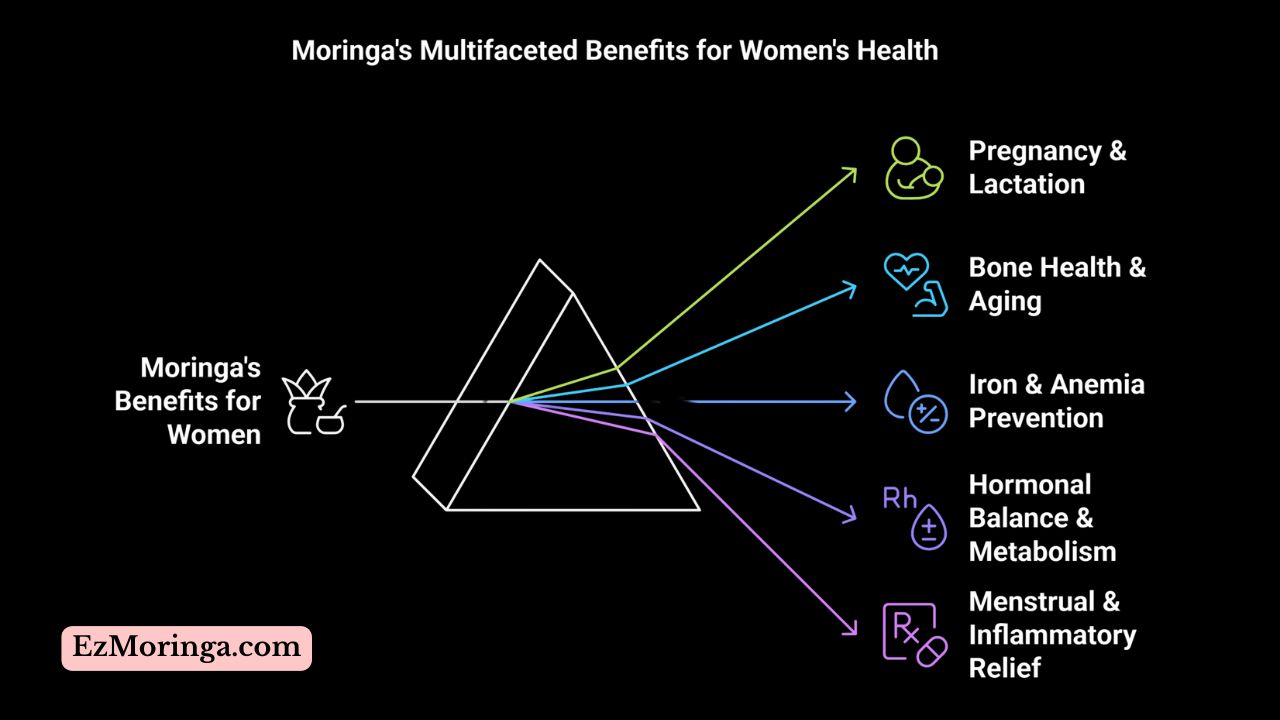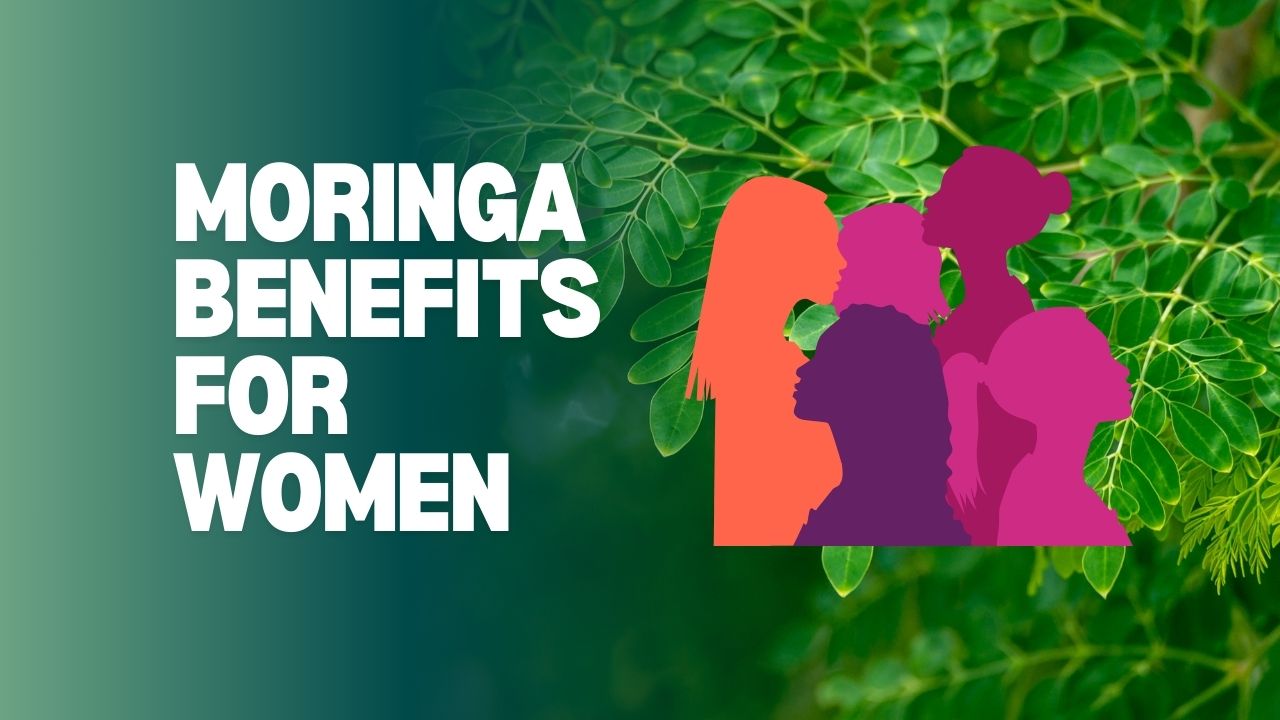Table of Contents
Moringa oleifera, often called the “miracle tree,” is renowned for its impressive nutrient profile and medicinal properties.
But for women specifically, Moringa offers targeted health benefits across all life stages—from adolescence and pregnancy to menopause and aging. Packed with iron, calcium, antioxidants, and essential vitamins, it serves as a natural solution to many female-specific health concerns, including anemia, hormonal imbalances, and osteoporosis.
Different cultures have long recognized Moringa’s benefits for women. In the Philippines, it is traditionally used to boost breast milk supply, while in India, pregnant women are encouraged to consume Moringa to prevent iron deficiency anemia.

Now, modern science is catching up, proving its effectiveness in addressing women’s nutritional and hormonal needs.
Let’s explore how Moringa supports women’s health at every stage of life.
1. Moringa Benefits for Women During Adolescence and Early Adulthood
1.1 Combating Iron Deficiency and Anemia
Iron deficiency anemia is common in adolescent girls and young women due to menstruation. Moringa leaves provide 25 times more iron than spinach, making it a powerful natural supplement for maintaining healthy hemoglobin levels and preventing fatigue, dizziness, and weakness.
Research has shown that Moringa significantly boosts iron absorption and enhances red blood cell production.
1.2 Hormonal Balance and PCOS Support
Moringa contains β-sitosterol, a plant compound known for its role in balancing hormones and reducing inflammation. Women with Polycystic Ovary Syndrome (PCOS) may benefit from Moringa’s ability to improve insulin sensitivity, reduce oxidative stress, and lower androgen levels.
Research suggests that Moringa’s bioactive compounds can aid in regulating insulin, which plays a crucial role in PCOS management.
1.3 Healthy Skin and Hair
Thanks to its antioxidant and anti-inflammatory properties, Moringa helps combat acne, skin irritation, and premature aging. Its rich vitamin E and omega-3 fatty acids nourish the scalp, promoting healthier, stronger hair.
Studies indicate that Moringa oil is effective in moisturizing skin, reducing wrinkles, and healing inflammation.
2. Moringa Benefits for Women in Pregnancy and Postpartum
2.1 Enhancing Maternal Nutrition
Pregnancy demands higher levels of iron, calcium, protein, and folate, all of which Moringa provides in abundance. It is particularly useful in preventing gestational anemia, a condition affecting over 40% of pregnant women worldwide.
Research confirms that Moringa’s nutrient-dense leaves improve maternal health and fetal development.
2.2 Boosting Breast Milk Supply (Galactagogue Effect)
Moringa is widely used in the Philippines, India, and Africa to increase breast milk production in lactating mothers. It works by stimulating prolactin, the hormone responsible for milk secretion.
A 2013 study found that mothers who consumed Moringa had a significant increase in milk production within a few days.
2.3 Postpartum Recovery and Energy Boost
New mothers often experience fatigue, nutrient depletion, and hair loss. Moringa’s iron, protein, and antioxidants aid in faster recovery, enhanced energy levels, and hair regrowth.
3. Moringa Benefits for Women in Their 30s and 40s
3.1 Hormonal Health and Menstrual Relief
Women in their 30s and 40s may experience PMS, heavy periods, and mood swings due to fluctuating hormones. Moringa’s anti-inflammatory and magnesium-rich content helps ease menstrual cramps and regulate cycles.
Moringa is a natural source of phytoestrogens, which support hormonal balance.
3.2 Supporting Metabolism and Weight Management
Moringa contains chlorogenic acid, which supports fat metabolism and glucose control, making it beneficial for weight management and reducing obesity-related risks.
Studies indicate that Moringa extract reduces fat accumulation and improves metabolic rate.
4. Moringa for Menopause and Aging Women
4.1 Preventing Osteoporosis and Strengthening Bones
Women post-menopause experience bone loss due to declining estrogen levels. Moringa’s high calcium content (four times more than milk) and vitamin K help maintain bone density and reduce fracture risk.
Research confirms that Moringa increases bone mineral density and reduces oxidative stress on bones.
4.2 Heart Health and Cholesterol Management
Menopausal women are at higher risk of heart disease and high cholesterol. Moringa contains quercetin, flavonoids, and omega-3s, which lower bad cholesterol and improve heart health.
Studies confirm that Moringa reduces LDL cholesterol and supports cardiovascular health.
4.3 Cognitive Health and Memory Support
Moringa’s antioxidants help reduce oxidative stress in the brain, potentially lowering the risk of Alzheimer’s and cognitive decline.
Research indicates that Moringa enhances memory, learning, and neuroprotection.
5. How to Use Moringa for Maximum Benefits
Moringa is available in powder, tea, capsules, fresh leaves, and oil. If you have a busy lifestyle and want an easy moringa supplement solution, then you can choose Moringa leaf powder capsules to be taken daily. One of the best brands for moringa leaf powder is moringa magic.
Here’s how women can incorporate it into their diet:
- 🌿 Pregnancy & Postpartum: 1 tsp Moringa powder in smoothies or soups for extra nutrients.
- 💪 Menstrual & PCOS Relief: Moringa tea to help balance hormones.
- 🦴 Menopause & Bone Health: 2 capsules daily to maintain calcium levels.
- ❤️ Heart Health: Moringa-infused water or salad dressing for cholesterol control.
⚠️ Note: While Moringa is safe for most women, pregnant women should consult a doctor before consuming high doses.
FAQ
Does Moringa Replace Multivitamins?
Moringa can serve as a natural alternative to multivitamins due to its impressive nutrient profile. It contains 92 nutrients, 46 antioxidants, and all 9 essential amino acids, offering a broad range of vitamins and minerals like vitamin A, vitamin C, calcium, potassium, and iron.
Unlike synthetic supplements, moringa’s nutrients are easily absorbed since they come from a whole-food source. While it may not replace a multivitamin in every scenario, particularly for those with specific deficiencies, it can be a valuable addition to a balanced diet. Consult a healthcare provider to determine if moringa suits your nutritional needs.
What are the moringa benefits for women over 50?
Moringa offers numerous benefits for women over 50, thanks to its nutrient-rich profile and powerful antioxidants. It supports bone health by providing calcium, essential for maintaining bone density and reducing the risk of osteoporosis. The antioxidants in moringa, like quercetin and kaempferol, combat oxidative stress, promoting heart health and lowering cholesterol levels.
For women experiencing joint pain or inflammation, moringa’s anti-inflammatory compounds may relieve discomfort and improve mobility. It also supports skin health by reducing signs of aging through its antioxidants and collagen-boosting properties. Additionally, moringa’s high iron content can combat anemia, reducing fatigue and boosting energy.
With potential benefits for hormonal balance and brain health, moringa may support memory, cognitive function, and overall well-being. Always consult a healthcare provider before starting moringa, especially if you have underlying health conditions.
Does moringa benefits include hormonal balance for women?
Yes, moringa may support hormonal balance in women, thanks to its rich composition of plant compounds. It contains β-sitosterol, a phytosterol known to act as a hormone precursor, which can help regulate estrogen levels. This is particularly beneficial for women experiencing hormonal fluctuations during menstruation, menopause, or conditions like PCOS.
Additionally, moringa’s influence on insulin sensitivity may further aid hormonal regulation, making it potentially beneficial for women with gestational diabetes or metabolic imbalances. While its nutrients offer significant support for hormonal health, consulting a healthcare professional is recommended for personalized guidance
Does moringa help in boosting breast milk?
Yes, moringa is often used to boost breast milk production. It contains phytosterols like stigmasterol, sitosterol, and kampesterol, which act as hormone precursors, stimulating estrogen production. This increase in estrogen can enhance the growth of mammary gland ducts, promoting milk production.
In countries like the Philippines, moringa, also known as malunggay, is traditionally used postpartum to support lactation. Studies, including clinical trials, have shown that moringa can enhance breast milk volume in mothers, particularly those with preterm infants. Additionally, it provides essential nutrients, supporting both the mother’s health and the baby’s development. For personalized advice, consult with a healthcare provider
Does Moringa Tea Help in the Morning for Women?
Yes, drinking moringa tea in the morning can be beneficial for women. It’s a natural way to start the day with a nutrient boost, as moringa is packed with vitamins A, C, and E, along with essential minerals like calcium, potassium, and iron. These nutrients support energy levels, bone health, and overall well-being.
Additionally, moringa is a powerful source of antioxidants, surpassing even green tea. It may help reduce oxidative stress, promote hormonal balance, and offer anti-inflammatory effects. For lactating mothers, moringa tea is traditionally used to boost breast milk production.
While it doesn’t contain caffeine, many women report feeling a gentle, sustained energy boost without jitters. For best results, consider having 1-2 cups of moringa tea daily. As always, consult with a healthcare provider for personalized advice
